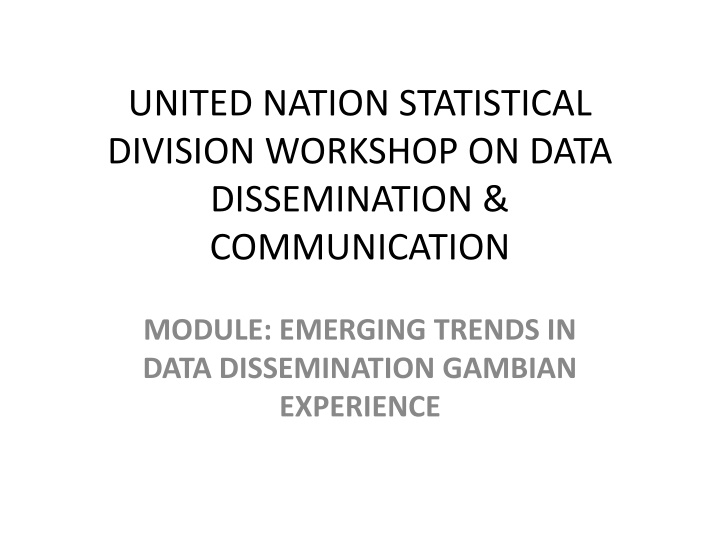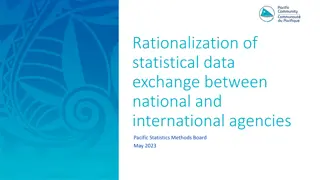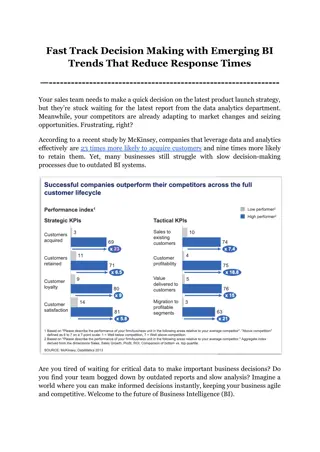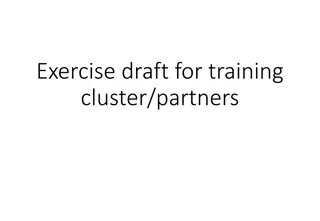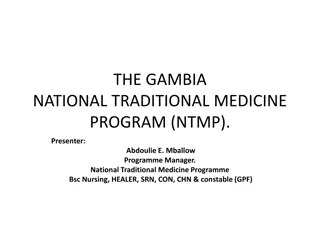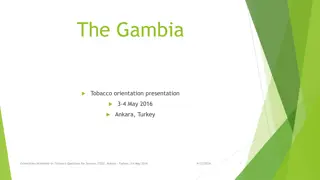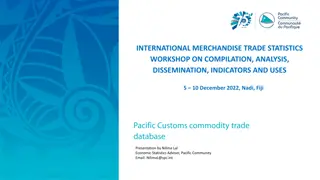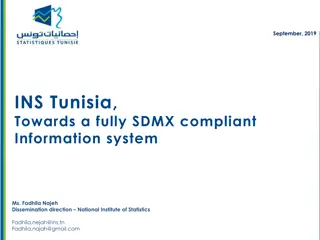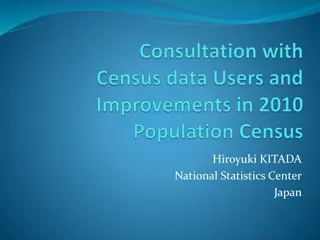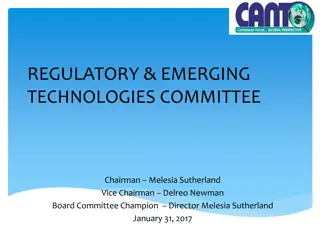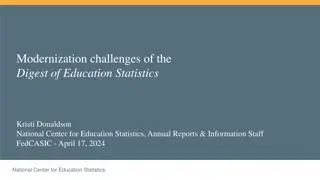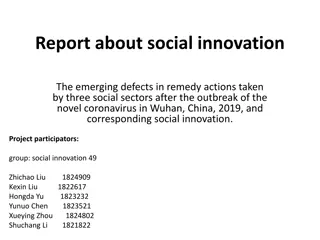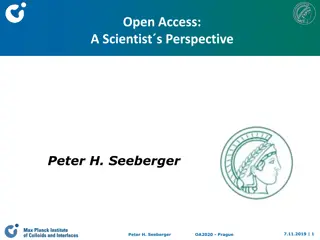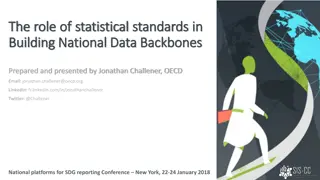Emerging Trends in Data Dissemination: The Gambian Experience
The Gambia, located in West Africa, showcases innovative methods of data dissemination through various channels such as internet and mobile phones. With a population of 1.9 million, the Gambia Bureau of Statistics plays a crucial role in disseminating statistical information to users at different levels. Traditional methods like workshops and publications are also utilized alongside modern approaches to ensure wider coverage and efficiency in sharing formatted data with users worldwide.
Uploaded on Oct 03, 2024 | 2 Views
Download Presentation

Please find below an Image/Link to download the presentation.
The content on the website is provided AS IS for your information and personal use only. It may not be sold, licensed, or shared on other websites without obtaining consent from the author.If you encounter any issues during the download, it is possible that the publisher has removed the file from their server.
You are allowed to download the files provided on this website for personal or commercial use, subject to the condition that they are used lawfully. All files are the property of their respective owners.
The content on the website is provided AS IS for your information and personal use only. It may not be sold, licensed, or shared on other websites without obtaining consent from the author.
E N D
Presentation Transcript
UNITED NATION STATISTICAL DIVISION WORKSHOP ON DATA DISSEMINATION & COMMUNICATION MODULE: EMERGING TRENDS IN DATA DISSEMINATION GAMBIAN EXPERIENCE
Background The Gambia is located in West Africa, bordered on the east, north and south by the Republic of Senegal and on the West by the Atlantic Ocean. It has a population of 1.9 million people according to the provisionary result of the 2013 Census. The main stay of the economy is based on Agriculture and Tourism. The Gambia Bureau of Statistics (GBoS) was established by the National Assembly Statistical Act 2005. The key mandate of the Bureau is to conduct, supervise, monitor and coordinate all the statistical activities at national level. GBoS is a semi-autonomous institutions headed by a Statistician General. It has five Directorates: Social Statistics; Coordination, Quality and Dissemination; Information Technology; National Accounts; Economic Statistics (CPI & PPI); and the Support Services Directorate. The Directorate of Coordination, responsible for disseminating statistical information. Quality & Dissemination is
What is Data Dissemination Data Dissemination could be defined as the sharing of formatted data with users. There are several levels and modes of sharing formatted data. Data can be shared at Global, National and District levels all targeting users of different socio-economical backgrounds.
METHODS Data could be disseminated using traditional modes/methods such as the followsing: Dissemination Seminars/workshops Published reports Press Briefings Electronic and Mass Media (Internet, News papers, Radio, Television, etc) Traditional methods using traditional structures at community levels
METHODS CONTINUED All the above mentioned methods are found to be usefull and effective but they vary in coverage and security. The best methods are those that are found to be effective, efficient with a much wider coverage and secured. In the Gambia all the above mentioned methods are used but the most prominent method is the internet and the mobile phones. The mobile phone is found to be more effective, efficient with much wider coverage. The internet is found to be effective, efficient but limited in coverage because some communities have no electricity supplies. Despite all these problems, the Internet is emerging and most prominent among all the methods/modes used in disseminating data.
Internet The best example of dissemination is the ubiquitous internet. Every single second throughout the year, data gets disseminated to millions of users around the world. Data could sit on the millions of severs located in scattered geographical locations.
Internet Continued Data dissemination on the internet is possible through many different kinds of communications protocols. The internet protocols are the most popular non-proprietary open system protocol suite in the world today. They are used in data dissemination through various communication infrastructures across any set of interconnected networks. Despite the name internet protocol, they are also well suited for local area networks (LAN) and wide area network (WAN) communication.
Internet Continued Using the internet, there are several ways data can be disseminated. The world wide web is an interlinked system where documents, images and other multimedia content can be accessed via the internet using web browsers. It uses a mark up language called hyper text markup language (HMTL) to format disparate data into the web browser.
Internet Continued The Email (electronic mail) is also one of the most widely used systems for data dissemination using the internet and electronic medium to store and forward messages. The email is based on the Simple Mail Transfer Protocol (SMTP) and can also be used by institutions/companies within an intranet system so that staff could communicate with other.
Internet Continued The more traditional ways for data dissemination which are still in wide use today are the telephone systems which include fax systems as well. They provide fast and efficient ways to communicate in real time. Some telephone systems have been simulated in internet applications by using the voice over internet protocol (VoIP).
Internet Continued Through this protocol, hundreds of free or minimally charge international phone calls are already available. This simulated phone calls is possible using the computer with microphone and speaker system or headphones. When a video camera is used, it could be possible to have video conferencing.
Internet Continued Of course, the use of non digital materials for data dissemination can never be totally eliminated despite the meteoric rise of electronic communication media. Paper memos are still widely used to disseminate data. The newspaper is still in wide circulation to communicate vital everyday information in news and feature iyems
Internet Continued Despite the efficiency of electronic means of data dissemination, there are still drawbacks which may take a long time to overcome, if at all. Privacy is one of the most common problems with electronic data dissemination. The internet has thousands of loop holes where people can peep into the private lives of other people. Security is also a related problem with electronic data dissemination. Every year, millions of dollars are lost to electronic theft and fraud. Every time a solution is found for a security problem, another malicious programs spring up somewhere in the globe.
Internet Continued Many Institutions/companies set up precautionary measures against security invasion in their information systems. Some set up user accounts with varying privileges to data access. Many set up internet firewalls and anti virus software on their computers to prevent intrusions.
Internet Continued Data dissemination is a very substantial aspect of business operation. Most of today s businesses are data driven. It is a common scenario where business organizations invest millions for data warehouses including hardware, software and manpower costs, to make data dissemination fast, accurate and timely. Information gathered from disseminated data form as basis for spotting industry trends and patterns and decision making in institutions/ companies.
THANK YOU VERY MUCH FOR YOUR ATTENTION MOMODOU LAMIN CHAM DIRECTOR OF COORDINATION, QUALITY & DISSEMINATION GAMBIA BUREAU OF STATISTICS (GBoS) THE GAMBIA
